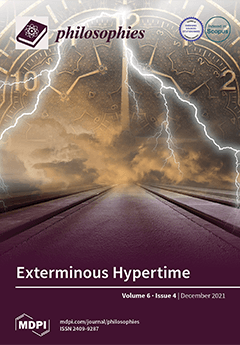We propose a new event ontology of the world, which is part of a general approach to philosophy based on combining ideas from science, ontology, and the philosophy of nature. While the position advocated here is grounded in science and philosophy, it attempts
[...] Read more.
We propose a new event ontology of the world, which is part of a general approach to philosophy based on combining ideas from science, ontology, and the philosophy of nature. While the position advocated here is grounded in science and philosophy, it attempts to move
beyond each of them by devising and exploring a series of technical (naturalized or naturalistic) ontological concepts such as Interconnectedness, the Whole, the Global, Chaos, the event assemblage, and Nonspace. A central theme in our event ontology is the mapping out of a fundamental critique of the theory of the organism and organization, especially when the latter two are viewed as processes in spacetime. In particular, and following earlier leads, we criticize the spacetime doctrine by arguing that it is not ontologically fundamental, where we suggest its replacement by more primordial naturalized ontological concepts of space such as ontospace and Nonspace. The event ontology of nature can be considered a radical alternative attitude toward the relation between the human and nature, an attitude, in fact, that has been repeatedly explored, though under very different headings, by numerous scattered thinkers throughout the history of ideas. We examine some of the past thinkers who contributed to this general but still incoherent body of thought, including Leibniz, Heidegger, Simondon, Ruyer, Deleuze, Whitehead, and Guattari. The goal of this article is to provide a condensed high-level view on this very complex and still evolving subject intended for a large audience, not necessarily only philosophers, but also scientists, mathematicians, technologists, theologians, sociologists, artists, and psychologists.
Full article





